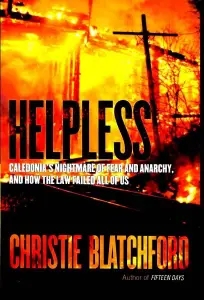January 19, 2010
As we’ve been taking a look at the various media outlets lately who have finally caught on to what’s happening in Caledonia, I think it’s only fair that we have a look at one who still has it all so wrong.
The Toronto Star published an editorial today called “much ado about Fantino” in which they make a bunch of classic, misinformed statements. It should be noted that I was unable to find the name of the author anywhere in the story, or on the website of the Star.
“Fantino and the OPP, who have been working hard to lower the temperature in the Caledonia conflict, do not appreciate McHale’s efforts.”
Fantino has been working hard to subvert the foundation of justice itself in Caledonia and has ordered his officers to play along. Sworn testimony from OPP officers has confirmed race based policing in Caledonia which the author would be aware of had they done their research.
“So in 2007, Fantino emailed the local mayor and councillors to ask them not to egg McHale on. Fantino also suggested that the OPP contract with the county would not be renewed if councillors continued to back McHale. The implied threat was perhaps ill-advised, but the thinking behind the email is understandable, given the pressures on the OPP from all sides in Caledonia.”
That’s not the context of the email at all, but how is it understandable that the commissioner would feel he has a right to use his authority to threaten and control democratically elected officials?
“If McHale can force Fantino aside by laying a private charge in this case, then what is to stop anyone else who disagrees with the OPP from doing the same?”
What is to stop them is evidence. Had this person bothered to spend even a few minutes researching private prosecution, they would have understood that you can’t lay a charge unless you have evidence of a crime. Disagreeing with the OPP is not evidence of a crime.
If a citizen has knowledge of those who are supposed to enforce the law breaking it, is the Star suggesting that they should ignore it and quietly watch this take place? Some may argue that there’s animosity between Mr. McHale and Mr. Fantino but such a matter has already been addressed in the case of Parkinson v. R when Judge Marshall stated:
“Besides this and in any event, this discretion to not issue because of vexation or ulterior motives should in my respectful view be very carefully exercised.. If it is not, I would expect there would be few private prosecutions. These cases are after all, generally brought by people because the crown or police for reasons of their own have not proceeded in the usual manner through the police or the crown. A private prosecution such as this is an important part of the public duty to oversee the administration of justice. This is clear on the authorities I have referred to” (section 24) and “We should look – except in the clear case – at public benefit not private demons.” (Section 26)
So we must ask ourselves who’s word is more valuable in a case such as this. The Honorable Superior Court Judge Marshall who spent months hearing submissions on this issue and did extensive research before coming to a conclusion, or someone who submitted an editorial to the Toronto Star and whose name appears nowhere in the column. Although his honor was not ruling on the case with Fantino, the case was not dissimilar as I attempted and succeeded at having 2 OPP officers criminally charged.
“The Caledonia situation is most regrettable and has been dragged out for far too long (four years). But it won’t be resolved by prosecuting Fantino or pushing him out of the commissioner’s office. Rather, it will take good-faith bargaining on the land claims and related issues by both the federal and provincial governments and the Six Nations.”
The “Caledonia situation” is not about a land claim and negotiation will do nothing to solve it. Aside from the fact that the federal government has ruled there is no validity to the DCE claim, those who illegally seized it lost the right to hide behind a land claim the instant they picked up baseball bats, axes, chainsaws etc and attacked the police with them.
To suggest anything to the contrary is like saying that if the OPP come to my home to prevent me from committing a crime, I have a right to arm myself and attack them. Do I have that right? No. Should I have that right? No. Do the DCE occupiers have that right because they use the words “land claim”? NO!
How many corrupt cops would be on the streets today if all citizens buried their heads in the sand as the author seems to suggest is appropriate in this case? Are we really to believe that parliament didn’t intend private citizens to have the right to prosecute those in authority when they wrote section 507.1 of the criminal code?
507.1 states “In the context of a private prosecution, s. 507.1 of the Criminal Code requires a justice who receives an Information laid by a private informant to refer it to a provincial court judge or a designated justice who shall consider whether to compel the appearance of the accused to answer the charge on the Information.”
Nowhere does it say “except when the accused is a police officer or other official who some may find politically undesirable to prosecute.”
It’s very sad to see that the Star apparently continues to believe enforcement of the law is not the solution to lawlessness. Fortunately I seriously doubt that the majority of Canadian citizens would agree.
Jeff Parkinson




